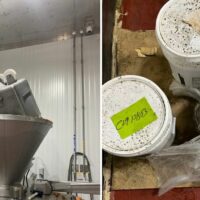
Jennifer Stojkovic, Founder, Vegan Women Summit, is one of 30 women investors recently profiled by FoodHack.
Every week we track the business, tech and investment trends in CPG, retail, restaurants, agriculture, cooking and health, so you don’t have to. Here are some of this week’s top headlines.
While women remain under-represented in the foodtech world, there are plenty of females at the forefront of the industry’s most breakthrough technologies and ideas, especially when it comes to funding. FoodHack has put together a list of more than 30 female investors in foodtech worth watching right now.
Meanwhile, as war, inflation, and supply chain issues put global food security at risk, some are closely analyzing the important role smallholder farmers have in feeding the world.
Our newsletter takes a lot of time and resources to produce. Make a one time or monthly contribution to help us keep it going. Whether it’s $5 or $500, every bit helps and shows us that you value our work.
1. 30+ Women Angel Investors Funding the Future of Food and Climate Startups – FoodHack
With women still under-represented in the foodtech sector, FoodHack is profiling more than 30 females around the world who are “at the forefront of funding breakthrough technologies that shape a better future for people and planet.”
2. Can Smallholder Farmers Feed the World? – Offshoot
As the climate crisis deepens, we are collectively waking up to the immense harms of the industrial agriculture system, including environmental degradation, corporate consolidation, exploitation, and cultural erasure.
3. China’s First Mycelium Meat to Launch This Year As Vegan Food Sales Near $12B – Green Queen
Shanghai-based mycelium protein company 70/30 will launch a vegan shredded chicken made from biomass fermented protein. The product will be a first for China.
4. Food Waste Tech Firm Afresh Raises $115M – Food Dive
The Afresh operating system uses artificial intelligence to help reduce food waste at grocery stores. Series B funding will help the company to “scale across thousands more stores.”
5. Report: Israeli Companies Lead World in Plant-Based Food Tech Investments – Times of Israel
Israeli startups lead the world for plant-based alternative proteins, and come second only to those in the US for funds invested in the alternative protein industry as a whole, according to an updated report from the Good Food Institute Israel.
6. All G Foods Raises $25M to Make Cultivated Milk ‘Cheaper’ Than Cow Milk – Vegconomist
The Australian startup wants to undercut the price of conventional milk with its alternative made from cellular ag. The financing will help the company increase production and preparer for commercialization, pending regulatory approval.
7. Researchers Develop Blockchain App to Help Consumers Eat Sustainably – Food Matters Live
Researchers at Finland’s Aalto University have created a blockchain-based app to help consumers evaluate the environmental impact of their food choices. The Food Suffering & Wellbeing Index (FSWI) measures and collects data on food choices and show users the collective effect of their individual actions.
8. Everytable Raises $55M Series C Round – Restaurant Business
The health-focused concept prices its ready to eat meals based on the neighborhoods they serve. Funding will help the company to further expand its business.
9. More Americans Are Going Hungry, and It Costs More to Feed Them – NY Times
The increase in food insecurity is about inflation. The director of the nation’s largest network of food banks is seeing support dwindle as need rises
10. Clean Food Group Leaps Forward to Launch Palm Oil Alternative – EU Startups
The UK-based startup also just completed its seed round of €1.96 million ($2 million) led by Agronomics.
11. At $30 Million, Vertical Farm Spread Co. Sets Japan’s Series A Record High – Green Queen
Best known for its leafy greens, Spread is also working on growing strawberries indoors. New capital will fund the company’s automated vertical farm, Techno Farm Fukuroi, slated to be operational in 2024.
12. AppHarvest Announces $50M in Funding For Somerset Farm – iGrow News
The financing comes courtesy of two loans from the USDA, and will go towards completing the indoor farming company’s forthcoming berry-growing facility in Somerset, Kentucky.
13. Gail’s Investors Raise $512 Million Fund Backed by Abu Dhabi – Bloomberg
The new fun from food industry entrepreneurs Henry McGovern and Steven Winegar will focus on restaurants. Primary backing for the McWin Restaurant Fund comes from The Abu Dhabi Investment Authority
14. ‘I Sold the Rights to My Groove Armada Songs to Buy a Farm’ – The Guardian
Fifteen years ago, Andy Cato, one half of electronic music band Groove Armada, read a sobering article about the environmental consequences of food production. He’s now a regenerative farmer and the co-founder of Wildfarmed.
15. Can Food Crops Grow in the Dark? Scientists Are Working Out How – National Geographic
Experiments suggest that it might become possible to nourish plants without photosynthesis—a tool that could one day help feed astronauts and a crowded planet.





